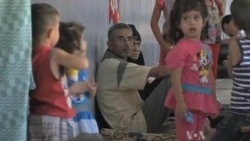LONDON —
An outbreak of polio among children in Syria has the potential to spread rapidly, doctors are warning. It is Syria’s first polio outbreak in 14 years - and aid agencies have begun emergency vaccination programs.
The province of Deir al-Zour in eastern Syria has seen heavy fighting in recent weeks between government and rebel forces.
Now there is a new emergency. Polio has been detected among several children in the area.
Oliver Rosenbauer is from the Polio Eradication Program at the World Health Organization.
“A lot is still unknown and investigations are still ongoing. They all appear to be very young so less than age 2 and they all appear to be under or unimmunized," said Rosenbauer.
Before the outbreak of conflict in Syria, the United Nations says 95 percent of children were immunized against the disease. Now there are an estimated half a million children who have not been vaccinated.
The World Health Organization, alongside the Syrian Ministry of Health, has begun a vaccination program targeting 2.4 million children.
Elias Durry, the WHO’s emergency coordinator for polio eradication in Pakistan, says there is a danger that the outbreak could spread rapidly.
“When a virus gets introduced to a country that has not had a lot of immunization in some years, you see really a major outbreak where hundreds of children are getting paralyzed from something that could have been prevented," said Durry.
Polio flourishes in unsanitary conditions and can cause paralysis and death. It is highly contagious and children are especially vulnerable.
Nine-hundred days of conflict has taken a big toll on Syria’s public health system, says Andrej Mahecic of the U.N. refugee agency.
“It is estimated that about half the medical facilities have been affected by the conflict in some way. More than 1,500 doctors have left the country. Certainly a lot more medical staff has also left the country as the crisis continued to unfold. So this certainly has an impact on the conditions inside Syria.”
The war has forced millions of people from their homes - and refugees are on the move both within Syria and over its borders. Again, Andrej Mahecic:
“Mass vaccinations have been taking place among the refugee population in the neighboring countries. Some of the children have been systematically vaccinated already on the border, but clearly more needs to be done, and new vaccinations are being planned in the weeks and months to come," he said.
The U.N. this week chartered a plane to fly vaccines and emergency food aid into Beirut - from where it is being trucked into Syria. Aid agencies say the fighting makes access to vulnerable populations extremely difficult.
The province of Deir al-Zour in eastern Syria has seen heavy fighting in recent weeks between government and rebel forces.
Now there is a new emergency. Polio has been detected among several children in the area.
Oliver Rosenbauer is from the Polio Eradication Program at the World Health Organization.
“A lot is still unknown and investigations are still ongoing. They all appear to be very young so less than age 2 and they all appear to be under or unimmunized," said Rosenbauer.
Before the outbreak of conflict in Syria, the United Nations says 95 percent of children were immunized against the disease. Now there are an estimated half a million children who have not been vaccinated.
The World Health Organization, alongside the Syrian Ministry of Health, has begun a vaccination program targeting 2.4 million children.
Elias Durry, the WHO’s emergency coordinator for polio eradication in Pakistan, says there is a danger that the outbreak could spread rapidly.
“When a virus gets introduced to a country that has not had a lot of immunization in some years, you see really a major outbreak where hundreds of children are getting paralyzed from something that could have been prevented," said Durry.
Polio flourishes in unsanitary conditions and can cause paralysis and death. It is highly contagious and children are especially vulnerable.
Nine-hundred days of conflict has taken a big toll on Syria’s public health system, says Andrej Mahecic of the U.N. refugee agency.
“It is estimated that about half the medical facilities have been affected by the conflict in some way. More than 1,500 doctors have left the country. Certainly a lot more medical staff has also left the country as the crisis continued to unfold. So this certainly has an impact on the conditions inside Syria.”
The war has forced millions of people from their homes - and refugees are on the move both within Syria and over its borders. Again, Andrej Mahecic:
“Mass vaccinations have been taking place among the refugee population in the neighboring countries. Some of the children have been systematically vaccinated already on the border, but clearly more needs to be done, and new vaccinations are being planned in the weeks and months to come," he said.
The U.N. this week chartered a plane to fly vaccines and emergency food aid into Beirut - from where it is being trucked into Syria. Aid agencies say the fighting makes access to vulnerable populations extremely difficult.












